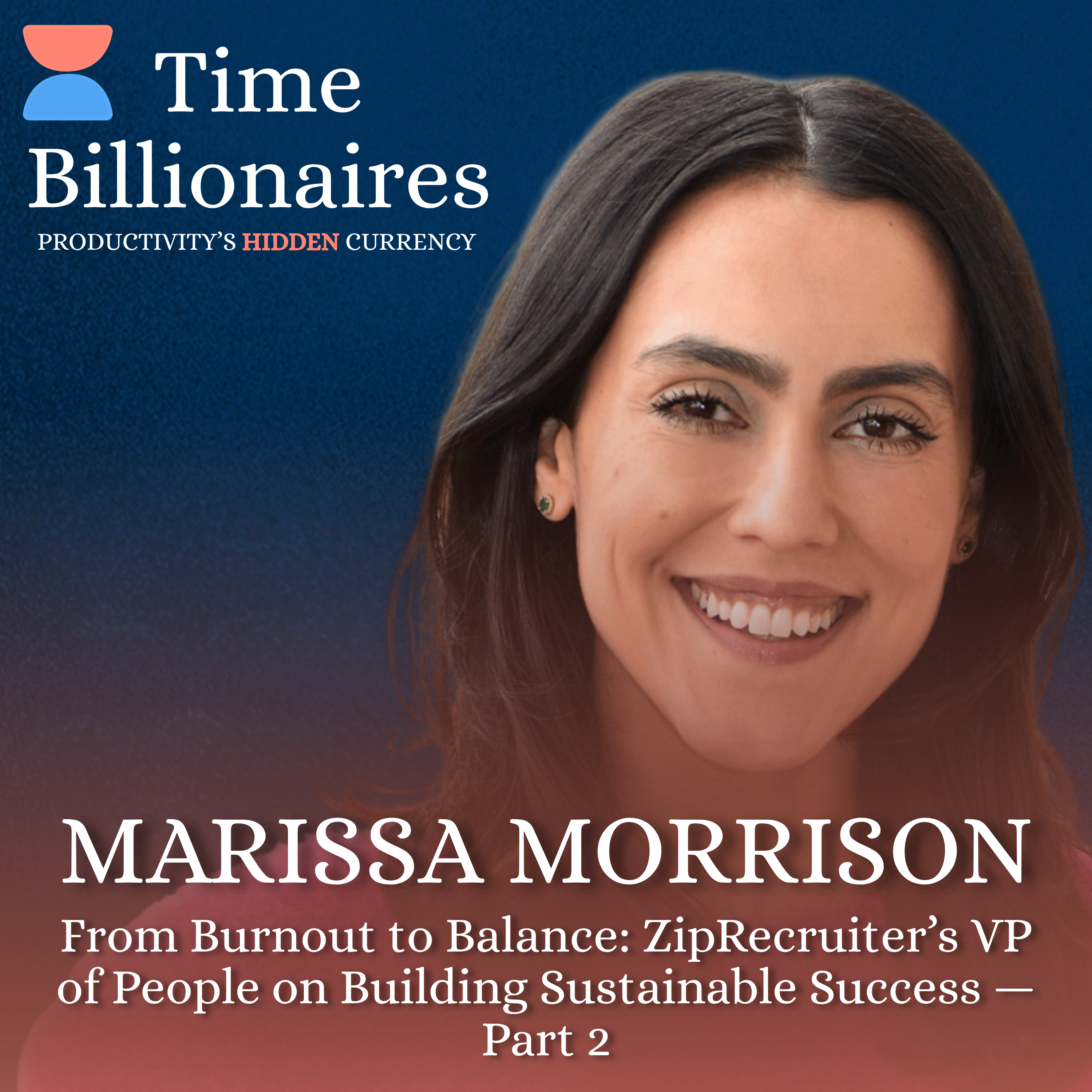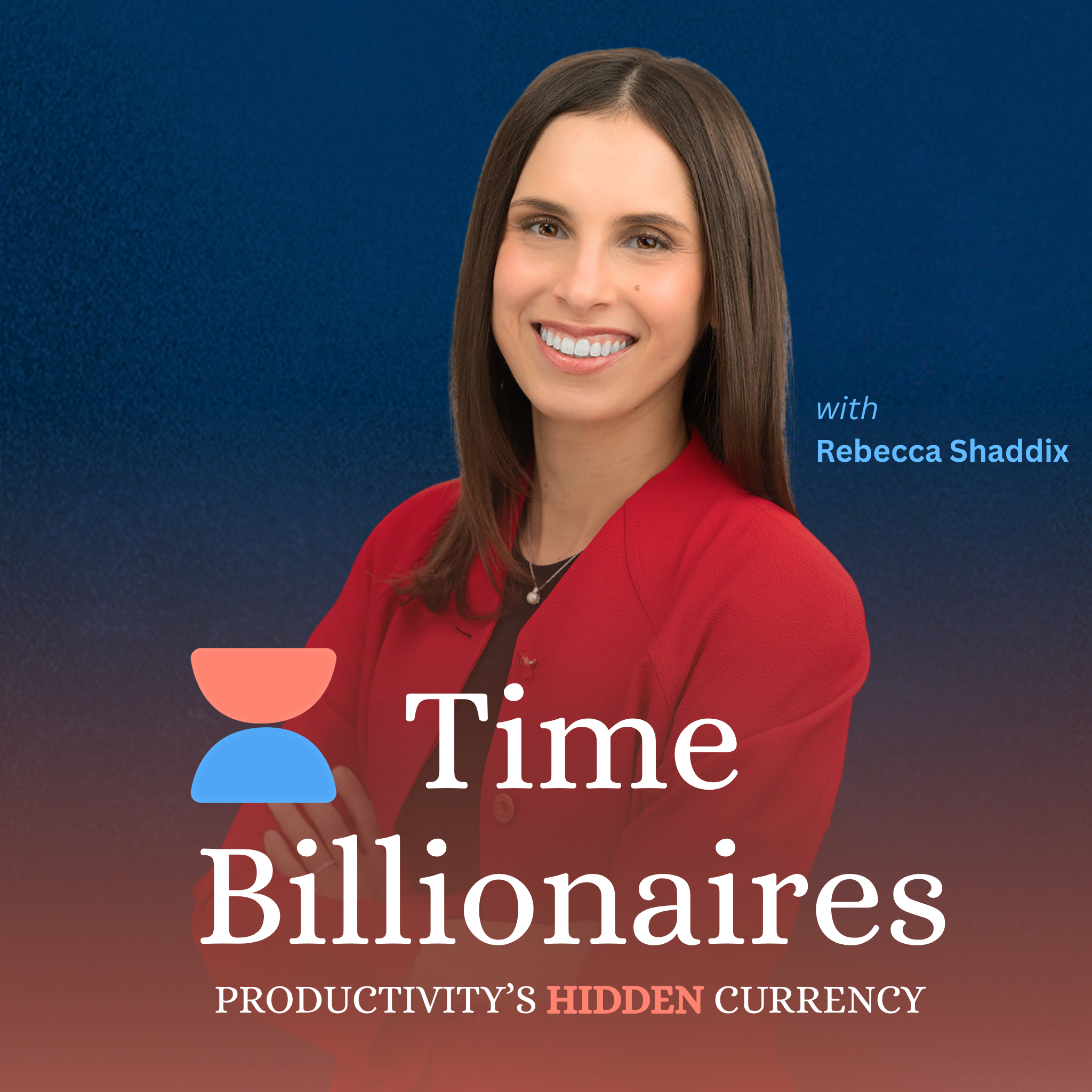Episode Transcript
[00:00:01] Speaker A: Hey there billionaire. Yep, I'm talking to you. If you expect to live another 31 years, you're already a billionaire. Not in money, but in the real measure of wealth, time. That's because 31 years is roughly a billion seconds. But most of us waste time in ways we'd never waste money. The currency of time billionaires is micro moments, those 90 second to 15 minute gaps hidden between the structured parts of our day. This podcast is about reclaiming them with quick, research backed ideas to help you feel more creative, productive and alive. Welcome to Time Billionaires. Let's make your next micro moment count.
[00:00:44] Speaker B: Hey there billionaire. Thanks for joining me on today's episode. I'm your host, Rebecca Shadix. When I first started working remotely, I noticed something I'd probably always done, but seemed to be doing a lot more now.
Every time I had a break between meetings, I'd instinctively check my email or reach for my phone. It felt harmless, just filling a little downtime. But I came to realize there's no such thing as neutral time. If something isn't adding to your life, it's detracting from it. This is true of friendships, romantic relationships, hobbies, chores and jobs. Every scroll, every check, every microdistraction shapes your brain, your habits and your perception of reality. This isn't my opinion. This is neuroscience.
All of these inputs impact our brain's default state and the problems our brains fixate on when we're sleeping or focus on something else. Everything we do gets better with practice, and we're always practicing something. For a long time, I was spending about four hours a day practicing doom scrolling and frenetically checking emails. Over time, that pseudo productivity made me more stressed, less creative, and ironically, less productive. Even though I was constantly on When I started looking for solutions, the advice out there seemed incomplete. The advice that I found seems to come back to time management experts telling me to do things like log my time in journals, to delete, delegate or defer less important things or eliminate all the little fragments, what they call time confetti. This was decent enough advice, but it didn't address the reality of where most of my wasted time was spent. I couldn't remove the four to seven minute breaks between zoom meetings. I wasn't going to stop brewing coffee or driving or waiting in doctor's offices. Removing my time confetti wasn't exactly an option. The real problem was how I was spending those micro moments. And here's where it gets bigger than just distraction. Wasting micro moments isn't just inefficient it's the gateway to mediocrity.
And I've come to realize that the biggest threat to our happiness isn't failure. It's mediocrity. Because over time, the difference between where we are in mediocre situations and where we could be is a lot bigger than we think. When things are objectively terrible, we act quickly. We pivot fast when things fall apart or clearly aren't working out. But when things are just okay, not terrible, not thrilling, we tend to languish. We settle.
We fixate on what's good and okay enough about our current situation and not what our goals are or our core values for how to make decisions or what could be better.
And that's where we lose years without realizing it.
The example that comes to mind when I think about this is Harper Lee, the author of To Kill a Mockingbird. After the book's massive success, she feared she'd never write anything that good again.
So instead of risking that outcome, she chose the only path that guaranteed that outcome.
She didn't publish another book again in her lifetime.
That's learned helplessness. And it's surprisingly easy to slip into that in smaller ways, too, whether it's staying in an okay but uninspiring relationship or letting the little distractions run our day again. If we were in a terrible relationship, we'd realize it and leave. But in an okay relationship or job, we think about all the comfort and good enough things we'd be giving up.
And to solve this, we also tend to convince ourselves that working harder is always the answer, that putting in more effort must mean more reward.
But it's not just about effort. It's about using the right tool for the job.
Choosing the wrong way to spend your time is like trying to mow your lawn with scissors. Sure, scissors are great. They're useful in a lot of situations. They're a great invention. But they're not useful for mowing acres of grass.
If your daily micro moments aren't aligned with what actually fulfills you, more effort just burns you out faster. Micro moments aren't meaningless. They're the tools you can start using to build the life you actually want. Here's what I discovered after years of research, hundreds of books, and a lot of personal trial and error, that the need for agency over how we spend our time is fundamental and universal.
But there's a lot of ways we don't have control over how we spend our time.
And what I found is that you don't need a total life overhaul. You don't need to rearrange your whole schedule, and you definitely don't need to hustle harder.
Sometimes the difference between where you are and where you'll be happiest is a lot smaller than you think.
The path to feeling more grounded, creative, and fulfilled isn't massive reinvention. It's the accumulation of small wins that you can control throughout your day. It's about noticing and reclaiming the micro moments that already exist and are just wasted. Currently, if we don't choose how to spend our time consciously, we're choosing it subconsciously and defaulting to our patterns and practice behaviors. Think about something as simple as the advice to focus on your breath when you're meditating I never knew why I was doing this, so it felt random. I thought I might as well have been focusing on my leg. But when I learned that the reason we focus on our breath is because by definition, our breath can only be in the present, it can never be in the past, and it can never be in the future. It can help us overcome the rumination of hoping the past will somehow be different, and the anxiety of worrying about things that may or may not happen in the future. When I found myself obsessively scrolling, it was because I was convinced that this was how I'd stay informed or connected, or spark new ideas, or just satisfy my general curiosity about what was going on in the world. This autopilot mindset doesn't just shape how we spend our time, it also distorts how we interpret the time we do have. This episode is going to focus on how to get more out of a practice that a lot of people talk about as being the cure to anxiety, depression, and general malaise.
Gratitude. After researching this for about four years, I came to believe that the way we think about gratitude is often dead wrong. It can leave us feeling worse and more guilty than before we tried it. But the good news is there's a simple shift that can fix this, and I'll summarize it this Any gratitude practice that invokes a sense of comparison is inherently limited and is likely to make us feel worse. I call this weaponized mindfulness. When mindfulness or gratitude is used against ourselves to dismiss valid struggles, toxic positivity is related. You may have heard phrases like everything in your life is good, you have enough money, your kids are healthy. Why aren't you happy enough with this?
These negative comparisons shame you into trying to feel more grateful for something that might not actually make you happy.
One day I found myself peeling an orange for a snack, and in the classic mindfulness teachings. I thought to myself, I'm so grateful to have fresh organic food in my life. Most people don't. That thought, instead of inspiring peace or contentment, sparked a shame spiral that drained my energy. So I tried a different approach. I'm so grateful to have enough nutritious food right in my home. The atoms that comprise this orange have existed since the creation of the universe, just like the atoms that comprise my body. I'm so grateful to be part of something bigger than myself.
That shift from comparative gratitude to pure appreciation changed everything. It brought me back into the present and it renewed my energy. To start reclaiming your micro moments, I want to leave you with a quick thought exercise, a way to see hidden possibilities hiding in what may look like empty space.
So here's the first micro moment activity. Imagine holding a single strand of your hair. Now consider this. The width of that hair is around a million atoms across.
And those atoms, they're 99.9% empty space.
And remember, this matter can't be created or destroyed. So the atoms that comprise your hair or femur or neocortex have existed since the dawn of time and will always exist. They could have comprised a dinosaur skull or a meteorite, and in the future may be part of a black hole. The atoms have no idea what they were before or what they will be in the future. And as far as we're aware, the human brain is the only organic thing in the universe that understands that the universe even exists.
If you removed all of the empty space from the atoms that make up every human being on the planet, the entire population could fit inside a single apple. Sit with that for a moment and now apply this idea to your life. What empty space exists in your daily routine? Gaps of time or overlooked moments that you usually dismiss as unimportant? How much possibility is hiding in those seemingly small empty moments? Take 30 seconds to list one empty space in your day where you could claim a micro moment for something meaningful. It could be a two minute plank after dropping your kids off at school.
Three words of gratitude before getting out of bed or sending a handwritten note to a friend while you're waiting for coffee to brew. These micro moments are an opportunity for reflection, connection and creativity.
Everything.
Your time, your body, the universe itself is mostly empty space. The question is, how will you fill it? Thanks for being here and thanks for spending this micro moment with me. Let's make the next one count too.
[00:09:47] Speaker A: Thanks for spending this micro moment with me. If you found it valuable, share it with a fellow time billionaire and give.
[00:09:52] Speaker B: Us a rating to help others discover.
[00:09:54] Speaker A: The power of micro moments. For more ways to reclaim your time time, follow me. Rebecca Shadix on LinkedIn. See you next time.


